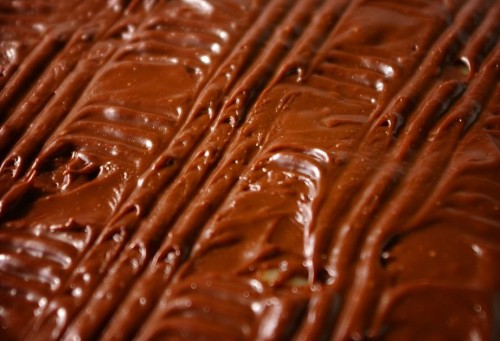Tag archives: liquids
Cutting the fat from chocolate

Go with the flow: physicist Rogjia Tao has a clever way to cut the fat in chocolate. (CC BY-SA 2.0/rore)
By Matin Durrani in Baltimore, Maryland, US
A couple of years ago my colleague James Dacey decided to give up eating chocolate, crisps, biscuits and cakes over Lent and it’s a virtuous – if very dull – decision I’ve been following every year since (even if James has long since strayed from the path of righteousness).
It was therefore with a dollop of smug satisfaction that I attended a talk at this year’s APS March meeting by Rongjia Tao – a physicist from Temple University in the US. He has developed a way of cutting the amount of fat in chocolate without, apparently, losing any of the taste.
Now, reducing the fat content in chocolate might seem straightforward – you just get rid of the fat, right? But it’s a harder problem than you’d think for chocolate manufacturers, who have to send liquid chocolate – a suspension of spherical cocoa particles in a melted fat of cocoa butter and other oils – down pipes and tubes.
The December 2015 issue of Physics World is out now
By Matin Durrani
As the festive season approaches, many of you will be looking forward to popping open a bottle of champagne. But before you treat yourself to a bottle, do check out the December 2015 issue of Physics World magazine, in which fizzy-wine physicist Gérard Liger-Belair from the University of Reims Champagne-Ardenne reveals his top six champagne secrets.
In the article, Liger-Belair explains why a fog appears when you pop open a bottle, the angle at which you should pour the wine into a glass, and how many bubbles there are in a typical glass of fizz. He also wades into that age-old question among sparkling-wine aficionados: flute or coupe?
The new issue also contains a fabulous flow chart, in which you can find out what sort of scientist you are. Don’t miss either our look back at the International Year of Light, a fantastic selection of Christmas books and a feature all about how origami is moving from art to application.
If you’re a member of the Institute of Physics (IOP), you can get immediate access to this article in the award-winning digital edition of the magazine on your desktop via MyIOP.org or on any iOS or Android smartphone or tablet via the Physics World app, available from the App Store and Google Play. If you’re not yet in the IOP, you can join as an IOPiMember for just £15, €20 or $25 a year to get full digital access to Physics World. You can also read Liger-Belair’s article online here.
The trebuchet challenge, the physics of ketchup bottles plus sage advice for budding science-fiction writers
By Hamish Johnston
“A surprising amount of stuff gets wasted every year because consumers can’t get it out of the packaging it came in,” writes Katie Palmer, who covers the science beat at Wired. In her article “The physics behind those no-stick ketchup and mayo bottles”, she explains how the company LiquiGlide has developed its slippery coating for the insides of bottles. The challenge was to create a permanently wet coating that would stick to the inside of the bottle but not mix with the liquid foodstuff – and it also has to be safe for human consumption.
LiquiGlide spun out of the lab of Kripa Varanasi at the Massachusetts Institute of Technology and has just announced that an international food-packaging supplier will be using the coating on its mayonnaise bottles. You can watch a demonstration of the coating in the video above.
View all posts by this author | View this author's profile
Physics in the fast lane
By Matin Durrani
Most of us want everything in life right here, right now. From fast food to fast cars, none of us can be bothered to hang about any longer than absolutely necessary. Where’s your reply to my e-mail I sent five minutes ago? Why haven’t you responded to my Tweet? Do you really expect me to read that 500-page novel for fun?
It was perhaps as an antidote to the ever-faster pace of life that so much has been made of two physics experiments that recently produced new data for the first time in years. I’m talking, of course, about the “pitch-drop” experiments at Trinity College Dublin in Ireland and the University of Queensland, Australia, which both consist of a glass funnel of sticky tar-like substance. A drop from the Trinity experiment finally fell last July, with a video of the event quickly going viral, while the Queensland set-up dripped this April for the first time in 13 years. (For more on why both experiments proved so popular, check out our great feature by Shane D Bergin, Stefan Hutzler and Denis Weaire from Trinity.)
But if you can’t be bothered to hang around for 10 years or more, you’ll be pleased to hear that physicists at Queen Mary University of London – led by Kostya Trachenko – have now set up a new pitch-drop experiment to explore the difference between solid and liquids on the much shorter timescale of just a few months.
View all posts by this author | View this author's profile